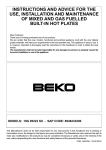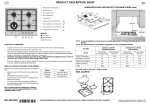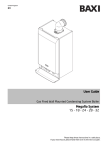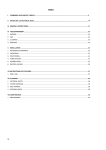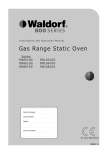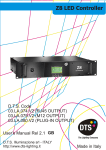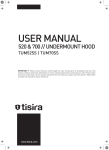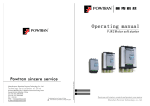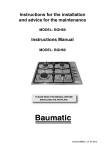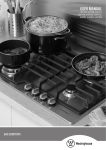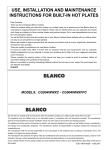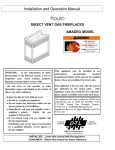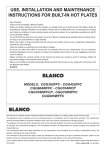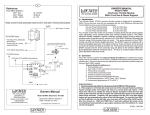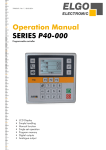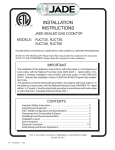Download Instructions and installation user manual
Transcript
Instructions and installation user manual MODELS: VGH64 - VGH64C VGH60 - VGH60C VGH64CF PLEASE READ THIS MANUAL BEFORE INSTALLING THE COOKTOP. COD:01099HT - 17.10.2012 Dear Customer, Congratulations on purchasing your new product from Think Appliances. To register your parts and labour warranty (some conditions apply please refer to your warranty card for more details) please contact out Customer Care team on: 1800 444 357 Our Customer Care centre is there to ensure you get the most out of your appliance. For example, should you want to learn more about recommended cooking temperatures, the various cooking functions available, how to set and program your LED clock, and importantly taking care of your appliance when cleaning, please call us because we are here to help you. It is important that you read through the following use and care manual thoroughly to familiarize yourself with the installation and operation requirements of your appliance to ensure optimum performance. We also carry a complete range of spare parts for all Think products. For all your spare parts enquiries please contact our team at Pronto Parts on: 1300 306 973 Again, thank you for choosing an appliance brought to you by Think Appliances and we look forward to being of service to you. Kind regards Management Think Appliances 2 DESCRIPTION OF THE COOKTOP MODELS: VGH64-VGH64C VGH64CF MODELS: VGH60-VGH60C 1 2 3 7 8 9 10 Rapid gas burne Semi-rapid gas burner Auxiliary gas burner Trivet 2 burner Burner 3 control knob Burner 1 control knob Burner 2 control knob (right) Natural U-LPG 12.0 MJ 7.1 MJ 4.1 MJ 10.4 MJ 6.2 MJ 3.5 MJ 14.5 MJ 11.4 MJ 11 Burner 2 control knob (left) 15 Electric ignition button 16 Ultra rapid gas burner/Wok 17 Trivet for ultra rapid burner 18 Burner 16 control knob To use the WOK pan stand on ultra rapid gas burner only. Put it on the ultra rapid pan stand and make sure of the stability (see fig.A). This cooktop was designed to be used exclusively as a cooking appliance: any other use (such as heating rooms) is to be considered improper and dangerous. Attention: this appliance has been manufactured for domestic use only.Do not modify this appliance. 3 USE 1) BURNERS the reduced rate position (small flame fig. 1). - Always place a lid on the pans. A diagram is screen-printed above each knob on the front panel. This diagram indicates to which burner the knob in question corresponds. After having opened the gas mains or gas bottle tap, light the burners as described below: - Manual ignition Push and turn the knob corresponding to the required burner in an anticlockwise direction until it reaches the full on position (large flame fig. 1), then place a lighted match near the burner. - Automatic electrical ignition Push and turn the knob corresponding to the required burner in an anticlockwise direction until it reaches the full on position (large flame fig. 1), then depress the knob. - Lighting burners equipped with flame failure device [VGH64CF ONLY]. The knobs of burners equipped with flame failure device must be turned in an anticlockwise direction until they reach the full on position (large flame fig. 1) and come to a stop. Now depress the knob in question and repeat the previously indicated operations. Keep the knob depressed for about 10 seconds once the burner has ignited. Note: you are advised not to try and light a burner if the flame divider (Burner Cap) is not correctly placed. In the event of the Burner flames being accidentally extinguished, turn off the burner control and do not attempt to re-ignite the burner for a least 1 minute. Burners Power ratings Natural Ultra rapid or Wok Rapid Semi-rapid Auxiliary 14.5 MJ 12.0 MJ 7.1 MJ 4.1 MJ Pan Ø in cm U-LPG 11.4 MJ 10.4 MJ 6.2 MJ 3.5 MJ 22 - 24 20 - 22 16 - 18 10 - 14 WARNINGS: - Burners with flame failure device [VGH64CF only] may only be ignited when the relative knob has been set to the Full on position (large flame fig. 1). - Matches can be used to ignite the burners in a blackout situation. - Never leave the appliance unattended when the burners are being used. Make sure there are no children in the near vicinity. Particularly make sure that the pan handles are correctly positioned and keep a check on foods requiring oil and grease to cook since these products can easily catch fire. - The machine must not be used by people (including children) with impaired mental or physical capacities, or without experience of using electrical devices, unless supervised or instructed by an expert adult responsible for their care and safety. Children should not be allowed to play with the equipment. - Never use aerosols in the vicinity of this appliance while it is in operation. - If the built-in cooktop has a lid, any spilt food should be immediately removed from this before it is opened. If the appliance has a glass lid, this could shatter when the cooktop becomes hot. Always switch off all the burners before closing the lid. - Do not store or use flammable liquids or items in the vicinity of the cooktop. - THIS PRODUCT IS NOT FOR USE IN MARINE CRAFT, CARAVANS OR MOBILE HOMES. - Containers wider than the unit are not recommended. - Do not modify this appliance. HOW TO USE THE BURNERS Bear in mind the following indications in order to achieve maximum efficiency with the least possible gas consumption: - Use adequate pans for each burner (consult the following table and fig. 2). - When the pan comes to the boil, set the knob to FIG. 1 FIG. 2 4 USE Notes: Use of a gas cooking appliance produces heat and moisture in the room in which it is installed. The room must therefore be well ventilated by keeping the natural air vents clear (fig. 3) and by activating the mechanical aeration device (suction hood or electric fan fig. 4 and fig. 5). Intensive and lengthy use of the appliance may require additional ventilation. This can be achieved by opening a window or by increasing the power of the mechanical exhausting system if installed. Star Trivet: use star trivet whenever using a small pot. Do not attempt to change the technical characteristics of the product because it can be dangerous. - If you should not use this appliance any more (or replace an old model), before disposing of it, make it inoperative in conformity with current law on the protection of health and the prevention of environmental pollution by making its dangerous parts harmless, especially for children who might play on an abandoned appliance. - Do not touch the appliance with wet or damp hands or feet. - Do not use the appliance barefoot. - The manufacturer will not be liable for any damage resulting from improper, incorrect or unreasonable use. - During, and immediately after operation, some parts of the cooktop are very hot: avoid touching them. - After using the cooktop, make sure that the knob is in the closed position and close the main tap of the gas supply or gas cylinder. - If the gas taps are not operating correctly, call the Customer Care Department. Abnormal Operation: Any of the following are considered to be abnormal operation and may require servicing: - Yellow tipping of the hob burner flame. - Sooting up of cooking utensils. - Burners not igniting properly. - Burners failing to remain alight. - Burners extinguished by cupboard doors. - Gas valves which are difficult to turn. In case the appliance fails to operate correctly, contact the customer care department.. Warning: during operation the work surfaces of the cooking area become very hot: keep children away! (*) Air inlet – minimun section 100 cm2 FIG. 3 FIG. 4 5 FIG. 5 CLEANING IMPORTANT: Always disconnect the appliance from the gas and electricity mains before carrying out any cleaning operation. traces of dirt (e.g. cement dust) or condensation marks. In the event where persistent marks appear: immediately clean affected areas with stainless steel cleaner, using a clean damp soft cloth. Ensure surface is rinsed and thoroughly clean of all marks and stainless steel cleaner. 2) COOKTOP Periodically wash the cooktop, the pan stands, the enamelled burner caps “C” and the burner heads “T” (see fig. 6) with lukewarm soapy water. It must also be cleaned the “AC” spark plugs and the“TC” flame detections. Following this, all parts should be thoroughly rinsed and dried. Never wash them while they are still warm and never use abrasive powders. Do not allow vinegar, coffee, milk, salted water, lemon or tomato juice from remaining in contact with the enamelled surfaces for long periods of time. PREVENTATIVE MAINTENANCE This cooktop should not require ongoing maintenance provided you ensure: - All spillages are cleaned up as soon as they occur. - Burners are kept clean. - Burner ports are free of debris, food or anything else that may cause an obstruction. - Electrode and thermocouples are kept clean. - Burners are re-assembled correctly. - Do not get water in the area where the injectors are located. WARNINGS: Comply with the following instructions, before remounting the parts: - Check that burner head slots “T” (fig. 6) have not become clogged by foreign bodies. - Check that enamelled burner cap “C” (fig. 6) have correctly positioned on the burner head. It must be steady. - The exact position of the pan stand is established by the rounded corners, which should be set towards the side edge of the cooktop. - Do not force the taps if they are difficult to open or close. Contact the technical assistance service for repairs. - Don’t use steam jets for cleaning the cooktop. CARE & MAINTENANCE To optimize the appearance and up keep of stainless steel: 1) ALWAYS keep stainless steel out of contact from acid/acid based solvent (liquid or vapour form). 2) After installation, wipe clean all stainless steel products with a soft damp cloth to remove any Note: continuous use could cause the burners to change colour due to the high temperature. FIG. 6 6 INSTALLATION TECHNICAL INFORMATION FOR THE INSTALLER Any adjoining wall surface situated within 200 mm from the edge of any hob burner must be a suitable non-combustible material for a height of 150 mm for the entire length of the hob. Any combustible construction above the cooktop must be at least 600 mm above the construction above the top of the burner and no construction shall be within 450 mm above the top of the burner. A minimum depth of 60 mm from the top of the work surface must be provided for this appliance. This appliance shall be installed only by qualified personnel and in accordance with the manufacturer’s installation instructions, local gas fitting regulations, municipal building codes, water supply regulations, electrical wiring regulations, AS 5601/AG 601 – Gas Installations and any other statutory regulations. Ventilation must be in accordance with AS 5601/AG 601 - Gas Installation. In general, the appliance should have adequate ventilation for complete combustion of gas, proper flueing and to maintain temperature of immediate surroundings within safe limits. The wall and bench surfaces must be capable of sustaining temperatures of 75 °C. All laminates, fixing adhesive and surfacing materials should be suitable for this temperature. 4) FIXING THE COOKTOP The cooktop has a special seal which prevents liquid from getting into the cabinet. Strictly comply with the following instructions in order to correctly apply this seal: - Detach the seals from their backing, checking that the transparent protection still adheres to the seal itself. - Overturn the cooktop and correctly position seal “E” (fig. 9) under the edge of the cooktop itself, so that the outer side of the seal perfectly matches the outer edge of the cooktop. The ends of the strips must fit together without overlapping. - Evenly and securely fix the seal to the cooktop, pressing into place with the fingers and remove the strip of protective paper from the seal and set the plate into the hole made in the cabinet. - Fix the hob with the proper brackets “S” and fit the prominent part into the porthole “H” on the bottom; turn the screw “F” until the bracket “S” stick on the top (fig. 10). 3) INSTALLING THE COOKTOP Check that the appliance is in a good condition after having removed the outer packaging and internal wrappings from around the various loose parts. If in any doubt, do not use the appliance and contact qualified personnel. Never leave the packaging materials (cardboard, bags, polystyrene foam, staples, etc.) within children’s reach since they could become potential sources of danger. The measurements of the opening made in the top of the modular cabinet and into which the cooktop will be installed are indicated in fig.8. Always comply with the measurements given for the hole into which the appliance will be recessed (see fig. 8). COMPLY WITH THE DIMENSIONS Overall Dimensions: 580 x 500 mm 4F FIG. 8 FIG. 9 7 A B C D E 553 473 63.5 63.5 63.5 min. FIG. 10 INSTALLATION Liquified Petroleum Gas In a LPG installation the gas regulation is made at the gas cylinder and regulation at the appliance is not required. To connect supply to the appliance use transition pieces as shown in figure 12. These pieces are supplied with the appliance on purchase. 5) GAS CONNECTION The gas connection is located in the rear and on the underside of the appliance 100 mm from the right hand side. A. The cooktop can be connected with rigid pipe as specified in AS5601 table 3.1. B. If installing with a hose assembly, install with a hose assembly that complies with AS/ANZ 1869 (AGA Approved), 10mm ID, class B or D, no more than 1.2m long and in accordance with AS5601. Ensure that the hose does not contact the hot surfaces of the cooktop, oven, dishwasher or any other appliance that may be installed underneath or next to the cooktop. The hose should not be subjected to abrasion, kinking or permanent deformation and should be able to be inspected along its entire length with the cooktop in the installed position. Unions compatible with the hose fittings must be used and all connections tested for gas leaks. WARNING: THE BURNER FLAME MUST BE ADJUSTED BY THE INSTALLER. FAULTY INSTALLATION WILL NOT BE COVERED UNDER WARRANTY. THE APPLIANCE IS FACTORY SET FOR NATURAL GAS. THE TEST POINT PRESSURE SHOULD BE ADJUSTED TO 1.00kPa WITH THE WOK BURNER OPERATING AT MAXIMUM. Natural Gas Natural Gas installations require the connection of a gas regulator at the appliance. Assemble the regulator (noting the gas flow direction) and transition pieces (supplied with the appliance), in accordance with figure 12. The transition piece on the supply side of the regulator must be provided by the installer. IMPORTANT: a perfect installation, adjustment or transformation of the cooktop to use other gases requires a QUALIFIED INSTALLER: a failure to follow this rule will void the warranty. FIG. 12 FIG. 11 8 INSTALLATION 6) ELECTRICAL CONNECTION - The power supply cable must be positioned so that no part of it is able to reach an overtemperature of 75 K. - Never use reductions, adapters of shunts for connection since these could create false contacts and lead to dangerous overheating. When the appliance is connected straight to the electricity main: - Install an omnipolar circuit-breaker between the appliance and the electricity main. This circuitbreaker should be sized according to the load rating of the appliance and possess a minimum 3 mm gap between its contacts. - Remember that the earth wire must not be interrupted by the circuit-breaker. -The electrical connection may also be protected by a high sensitivity differential circuit- breaker. You are strongly advised to fix the relative yellowgreen earth wire to an efficient earthing system. IMPORTANT: the appliance must be installed following the manufacturer's instructions. The manufacturer will not be liable for injury to persons or animals or property damage caused by an incorrect installation. The appliance is supplied with a 1800 mm long flexible supply lead. The point of attachment for this lead is located at the rear and on the underside of the appliance 380 mm from the right hand side. The voltage and power consumption are detailed on the underside of the appliance. Ensure that the appliance is correctly rated to the supply. Connect appliance by way of a switched power point. THE APPLIANCE MUST BE EARTHED Ensure that this power point is properly earthed. Look at the connection wiring diagrams (fig. 12/B). Warning: in order to avoid any hazard, any electrical work performed on this equipment or its associated wiring, should only be done by persons qualified by the supplier or similarly qualified persons. The socket outlet for this cooktop shall be installed near the cooktop and shall be easily accessible. The electrical connections of the appliance must be carried out in compliance with the provisions and standards in force. Before connecting the appliance, check that: - The voltage matches the value shown on the specification plate and the section of the wires of the electrical system can support the load, which is also indicated on the specification plate. - The electrical capacity of the mains supply and current sockets suit the maximum power rating of the appliance (consult the data label applied to the underside of the cooktop). - The socket or system has an efficient earth connection in compliance with the provisions and standards in force. The manufacturer declines all responsibility for failing to comply with these provisions. When the appliance is connected to the electricity main by a socket: - Fit a standard plug suited to the load indicated on the data label to the cable. - Fit the wires following figure n.13, taking care of respecting the following correspondences: Letter L (live) = brown wire; Letter N (neutral) = blue wire; Earth symbol = green - yellow wire. Before performing any service on the electrical part of the appliance, it must absolutely be disconnected from the electrical network. If the installation requires modifications to the home's electrical system or if the socket is incompatible with the appliance's plug, have changes or replacements performed by professionally-qualified person. In particular, this person must also make sure that the section of the wires of the socket is suitable for the power absorbed by the appliance. FIG. 13 COOKTOPS WITH 4 BURNERS FIG. 12/B 9 ADJUSTMENTS Always disconnect the appliance from the electricity main before making any adjustments. All seals must be replaced by the technician at the end of any adjustments or regulations. Our burners do not require primary air adjustment. a) Data Label The Data Label is located on the underside of the cooktop. A duplicate Data Label is supplied to adhere in an accessible area next to the cooktop. This cooktop is suitable for Natural Gas and Universal LPG; ensure that the available gas supply matches the Data Label. b) Before Leaving Check that there are no gas leaks, but do not use a naked flame to detect gas leaks. Ignite all burners to ensure correct operation of gas valves, burners, ignition and if fitted, flame failure valves. Turn gas taps to low flame position and observe stability of the flame. When satisfied with the cooktop, please instruct the user on the correct method of operation. In case the appliance fails to operate correctly after 7) TAPS Our taps are suitable for all gas, they are male conical type. “Reduced rate” adjustment - Switch on the burner and turn the relative knob to the “Reduced rate” position (small flame fig. 1). - Remove knob “M” (fig. 14 and 14/A) of the tap, which is simply pressed on to its rod. The by-pass for minimal rate regulation can be: beside the tap (fig. 14) or inside the shaft. In any case, to access to regulation, it can be done trought the insertion of a small screwdriver ‘’D’’ beside the tap (fig. 14) or in the hole ‘’C’’ inside the shaft of the tap (fig 14/A). Turn the throttle screw to the right or left until the burner flame has been adequately regulated to the “Reduced rate” position. The flame should not be too low: the lowest small flame should be continuous and steady. Reassemble the several components. It is understood that only burners operating with Natural gas should be subjected to the above mentioned adjustments. The screw must be fully locked when the burners operate with Liquid gas. all checks have been carried out, contact a qualified service agent in your area. FIG. 14 FIG. 14/A 10 CONVERSIONS 8) U-LPG TO NATURAL GAS CONVERSION PROCEDURE 9) NATURAL GAS TO UNIVERSAL LPG CONVERSION PROCEDURE Appliance models: Gas stainless steel cooktop models: VGH60C - VGH64C-VGH64CF VGH60 - VGH64 Appliance models: Gas stainless steel cooktop models: VGH60C - VGH64C-VGH64CF VGH60 - VGH64 1. Remove each burner cap and burner skirt. 2. Remove the U-LPG main injector with a 7 mm/VF tube spanner and replace with the appropriate size Natural Gas injector for each burner. The following injector sizes are required for Natural Gas: 1. Remove each burner cap and burner skirt. 2. Remove the Natural Gas main injector with a 7 mm/VF tube spanner and replace with the appropriate size U-LPG main injector for each burner. The following injector sizes are required for U-LPG: Burner Main injector Burner Main injector Ultra rapid/Wok Rapid Semi Rapid Auxiliary 1.76 mm 1.55 mm 1.20 mm 0.90 mm Ultra rapid/Wok Rapid Semi Rapid Auxiliary 0.94 mm 0.91 mm 0.70 mm 0.53 mm 3. Shut off gas supply to the appliance. 4. Disconnect gas inlet pipe from the U-LPG Gas test point inlet fitting. 5. Remove the U-LPG test point inlet fitting from the appliance. 6. Fit the Natural Gas Regulator supplied in the conversion kit. 7. Connect the gas supply to the Regulator. 8. Check for gas leaks. Do not use a naked flame to check for gas leaks. 9. Adjust the gas pressure to 1.00 kPa. 10. Remove the control knob, with a thin shaft blade screwdriver down the centre of each gas valve shaft, screw the by-pass injector anti-clockwise. Test the appliance on both high and low flame for each burner. If the burner fails to remain alight or the flame is not stable on the simmer setting, adjust the by-pass screw, until flame is stable. 11. If not already removed, remove the “Only for use with U-LPG” label adhered to the bottom panel near the gas connection. 3. Remove the control knob, with a thin shaft blade screwdriver down the centre of each gas valve shaft, screw the by-pass injector fully clockwise. 4. Shut off gas supply to the appliance. 5. Disconnect gas inlet pipe from the Natural Gas Regulator. 6. Remove the Natural Gas Regulator from the appliance. 7. Fit the U-LPG test point inlet fitting supplied in the conversion kit. 8. Connect the gas supply to the inlet fitting. 9. Check for gas leaks. Do not use a naked flame to check for gas leaks. 10. Adjust the gas pressure to 2.75 kPa. 11. Test the appliance on both high and low flame for each burner and check the gas pressure. If the burner fails to remain alight or the flame is not stable on the simmer setting, adjust the by-pass screw, until flame is stable. 12. If not already removed, remove the “Only for use with Natural Gas” label adhered to the bottom panel near the gas connection. 11 CONVERSIONS affix the label corresponding to the new gas regulation on the appliance instead of the already existing one. This label is supplied in the packet containing the spare injectors. The envelope with the injectors and the labels can be included in the kit, or at disposal to the Customer Care Department. For the sake of convenience, the nominal rate chart also lists the heat inputs of the burners, the diameter of the injectors and the working pressures of the various types of gas. 10) REPLACING THE INJECTORS The burners can be adapted to different types of gas by installing injectors suited to the type of gas required. To do this, first remove the burner tops using a wrench “B”. Now unscrew injector “A” (see fig. 15) and fit a injector corresponding to the type of gas required. It is advisable to tighten the injector in place. After the injectors have been replaced, the burners must be regulated as explained in paragraphs 7. The technician must reset any seals on the regulating or pre-regulating devices and BURNER ARRANGEMENT ON THE COOKTOP TABLE 1 BURNERS GAS NORMAL PRESSURE INJECTOR DIAMETER NOMINAL HEAT INPUT (MJ/h) (kPa) (1/100 mm) MAX. N° DESCRIPTION 1 RAPID U-LPG NATURAL 2.75 1.00 91 155 10.4 12.0 2 SEMI-RAPID U-LPG NATURAL 2.75 1.00 70 120 6.2 7.1 3 AUXILIARY U-LPG NATURAL 2.75 1.00 53 90 3.5 4.1 16 ULTRA RAPID U-LPG NATURAL 2.75 1.00 94 176 11.4 14.5 FIG. 15 12 SERVICING Always turn off the electrical ignition before proceeding with any servicing operation. Servicing should be carried out only by qualified personnel. Greasing the taps (see fig. 17 - 18) If a tap becomes stiff to operate, it must be immediately greased in compliance with the following instructions: - Remove the tap. - Clean the cone and its housing using a cloth soaked in solvent. - Lightly spread the cone with the relevant grease. - Fit the cone back in place, operate it several times and then remove it again. Eliminate any excess grease and check that the gas ducts have not become clogged. - Fit all parts back in place, complying with the demounting order in reverse. - The tight closure test must be done using a foamy liquid. To facilitate the servicing technician’s task, here is a chart with the types and sections of the powering cables and the ratings of the electrical components. 11) REPLACING COOKTOP PARTS To replace the components fitted inside the hob, take off the knobs, all the movable parts of the hobs (trivets, burners and caps) and the screws “V” on the burners (see fig. 16). After having carried out the above listed operations, the replacement of the electrical components and the taps is possible. REMARKS: before replacing the taps on the hob without flame failure device, take off the microswitches fitted on the taps. It is advisable to change seal “D” whenever a tap is replaced to ensure a perfect tightness. WARNING: MAINTENANCE MUST ONLY BE PERFORMED BY QUALIFIED PERSONS. FIG. 16 FIG. 17 13 FIG. 18 SERVICING CABLE TYPES AND SECTIONS TYPE OF COOKTOP Gas cooktop TYPE OF CABLE H05 RR - F SINGLE - PHASE POWER SUPPLY Section 3 X 0.75 mm2 ATTENTION!!! If the power supply cable is replaced, the installer should leave the ground wire longer than the phase conductors (fig. 19) and comply with the recommendations given in paragraph 6. FIG. 19 14 TECHNICAL ASSISTANCE AND SPARE PARTS Before leaving the factory, this appliance will have been tested and regulated by expert and specialized personnel in order to guarantee the best performances. Any repairs or adjustments which may be subsequently required may only be carried out by qualified personnel with the utmost care and attention. For this reason, always contact your Dealer or our nearest After Sales Service Center whenever repairs or adjustments are required, specifying the type of fault and the model of the appliance in your possession. Please also note that genuine spare parts are only available from our After Sales Service Centers and authorized retail outlets. The above data are printed on the data label put on the inferior part of the appliance and on the packing label. The above informations give to the technical assistant the possibility to get fit spare parts and a heaven-sent intervention. We suggest to fill the table below. MARK: ........................................................ MODEL: ..................................................... SERIES: ..................................................... 15 ! 16

















